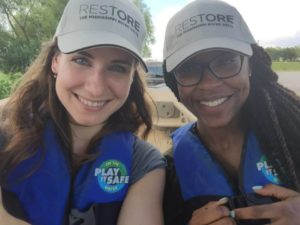When Jessica Ritter ’10 decided to forego veterinary school for a year after graduating from NC State, she did not know how much of an impact that decision would have on her life, or in the world. It is a decision that has led her to her current role as director of water resources and coastal policy at the National Wildlife Federation, shaping and guiding policy and advocacy work on issues ranging from clean water to national infrastructure investments and from disaster response to coastal community resilience.

In the summer after graduation and with the help of her Park Faculty Mentor, Dr. Bob Grossfeld, she landed a summer internship at Environmental Defense Fund, where she worked on a number of bills before the North Carolina state legislature. Afterward, she completed another internship in Washington, D.C. with Oceana, a national non-profit where she obtained first-hand exposure to Congress. She states these two internships were monumental in her decision to abandon veterinary school altogether and, instead, pursue a professional master’s degree in environmental management. Following graduate school, she covered ocean and weather-related issues while working for the U.S. Senate Committee on Commerce, Science, and Transportation. She says, “That time on Capitol Hill cemented my interest in national policy work, and helped me understand just how much [a few] words on a page of legislative text can influence the world.” In fact, it was the “common sense and bipartisan approach to wildlife conservation” that first attracted her to the National Wildlife Federation. In her first position with the organization, she was able to focus on the ecosystem restoration efforts unfolding on an unprecedented scale in the Gulf of Mexico with funding from the BP oil spill settlement following the Deepwater Horizon disaster.

Now the director of water resources and coastal policy, she manages a team of staff experts on a variety of issues and works with Congress and the relevant federal agencies to advance protections and programs that support clean water and healthy coastal, freshwater, and marine ecosystems. In addition to their work in Washington, D.C., they are also deeply engaged in regional restoration efforts spanning from the Chesapeake Bay to the Mississippi River Delta to the Everglades. In the most recent water resources development legislation, she helped include the requirement that the Army Corps of Engineers consider more natural solutions — like restoring wetlands, floodplains, and beaches — for flood control and prevention.
“My time as a Park Scholar exposed me to thought leaders and experiences that helped expand my view of professional possibilities after undergrad. The mentorship the program facilitated directly helped me to land my first internship after college, which set me on my current path. Perhaps more importantly, the program helped me to cultivate and maintain an ambitious vision for the change I wished to affect in the world through my professional life, even when my certainty around my originally intended path faltered. The Park Program challenged and inspired me to remain intentional about my professional pursuits and, though I have much work and exploration left to do, I carry that lesson with me.”
Her advice to current and future Park Scholars: “Be honest with yourself about what drives you and what brings you fulfillment, and give yourself the space and permission to change your mind if your original plan isn’t resonating. But when in doubt, try things out. As Leonardo Da Vinci once said, ‘Knowing is not enough; we must apply. Being willing is not enough; we must do.’”